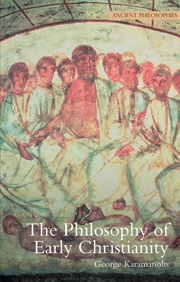Book contents
- Frontmatter
- Dedication
- Contents
- Preface
- Abbreviations
- Chronology
- Introduction
- 1 The Christian conception of philosophy and Christian philosophical methodology
- 2 Physics and metaphysics: first principles and the question of cosmogony
- 3 Logic and epistemology
- 4 Free will and divine providence
- 5 Psychology: the soul and its relation to the body
- 6 Ethics and politics
- Conclusion
- Appendix: the protagonists
- Notes
- Further reading
- Bibliography
- Index
4 - Free will and divine providence
- Frontmatter
- Dedication
- Contents
- Preface
- Abbreviations
- Chronology
- Introduction
- 1 The Christian conception of philosophy and Christian philosophical methodology
- 2 Physics and metaphysics: first principles and the question of cosmogony
- 3 Logic and epistemology
- 4 Free will and divine providence
- 5 Psychology: the soul and its relation to the body
- 6 Ethics and politics
- Conclusion
- Appendix: the protagonists
- Notes
- Further reading
- Bibliography
- Index
Summary
The notions of free will and divine providence are as central in the thought of early Christian philosophers as they are for their Hellenic contemporaries, Alexander, Plotinus, Porphyry and Iamblichus. By the time of Justin Martyr, Christians are already exhibiting a strong interest in the issue of free will and in the role of divine providence. Irenaeus, Tertullian, and Clement are seriously engaged with the issue, as they are eager to oppose the relevant Gnostic view, according to which free will pertains only to one class of men and indeed not the best one. The Christian interest in free will culminates with Origen, who advances a highly sophisticated theory. Unlike other parts of Origens philosophy, this theory was embraced by Basil and Gregory of Nyssa, who developed it further.
If we look at Scripture, however, either the Old or the New Testament, we do not find a discussion of this kind. What we do find are statements that bear on the issue of free will, such as that of Jesus, who wishes he could avoid suffering but follows his Father's willing (thelēma; Luke 22:42; Matthew 26:39; Mark 14:36); in the same context Jesus says that man's spirit is willing (prothymon) but the body is weak (Matthew 26:41; Mark 14:38). Particularly relevant are also some remarks of Paul in his Letters.
- Type
- Chapter
- Information
- The Philosophy of Early Christianity , pp. 144 - 180Publisher: Acumen PublishingPrint publication year: 2013



